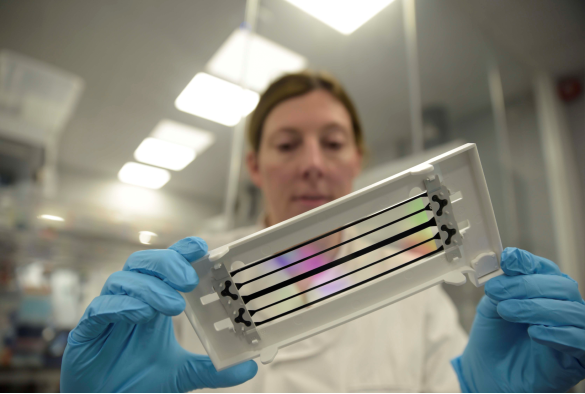A facility giving environmental scientists across the UK access to vital expertise and infrastructure to help advance their research has been funded through to 2031.
The £16m Natural Environment Research Council (NERC) award via the British Geological Survey will mean that the NERC Environmental Omics Facility (NEOF), a partnership between world-leading labs at the Universities of Liverpool and Sheffield, can continue to support researchers tackling big questions on biodiversity loss, climate change, soil health and more.
NEOF delivers state-of-the-art ‘omics’ expertise, capability and training. New omic technologies have transformed biology by allowing scientists to read genomes (genomics) and to measure the amounts of proteins (proteomics) or other chemicals (metabolomics) within living cells and organisms. Tiny amounts of DNA can be collected from the environment (environmental DNA, eDNA) to measure biodiversity and monitor the health of our soils, rivers and seas.
This creates a tremendous opportunity to understand the diversity of different individuals and species within the natural environment, their evolution, and the diversity of different characters and forms that allow them to live within their environment.
The University of Liverpool’s Professor Steve Paterson, Director of NEOF said: “Scientists wanting to use omic technologies in their research face significant hurdles such as costly equipment and a specialist skills and expertise gap in terms of applying these techniques and technologies.
“Understanding biodiversity is more pressing than ever, given the rate at which it is being lost from the planet and the central role that it plays in allowing species and ecosystems to respond to, and survive, climate change.
“To overcome these hurdles and equip scientists with the tools and skills they need to address their research questions using omics, we established the NERC Environmental Omics Facility (NEOF) in 2020 and I am delighted that this new funding will enable us to keep making an impact.”
NEOF is a unique capability within the UK that provides end-to-end support to NERC users from initial project design, through data generation and analysis. It is run by a team of scientists who are world-leading experts and are able to cover a broad range of omics methods, with experience of applying these to questions in environmental sciences.
The NEOF team have been able to generate impact themselves, evidenced through their work detecting SARS-CoV2 in environmental samples, and also in enabling users to generate impact within their own research.
Professor Paterson added: “We are delighted to support NERC with our world-leading omics facilities and expertise. For me, it is always fascinating to see the brilliant science coming through the facility and to be able help develop those projects from the initial discussions, through to data generation, analysis and to train the next generation of scientists. The University of Liverpool and NERC both tackle global challenges in climate science that urgently need solutions for the wellbeing of our society and the planet which is why the seven-year commitment to support NEOF is so welcome.”
NEOF has received this funding as part of a network of seven NERC facilities that host environmental analytical facilities and field equipment and expertise, totalling an investment of £70 million.
Professor Peter Liss, Interim Executive Chair of NERC, said: “NERC is committed to fostering ambitious world-leading research in environmental sciences, including investing in the UK’s national capability in environmental science analytical facilities, plus support and research equipment for fieldwork.
“This significant investment in NERC’s Scientific Support and Facilities portfolio will ensure that our facilities can continue to provide the expertise and support to continue to meet demand from the environmental science community over the next seven years.”
NERC is a part of UK Research and Innovation (UKRI).
